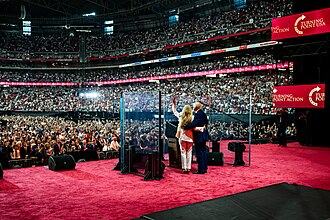
While it is too early to say if the ferment and fervor unleashed by the assassination of conservative Christian and political activist Charlie Kirk will have long-lasting religious effects, the events surrounding the tragedy do suggest a revival of the religious right, even if in new forms, according to several reports. In the Free Press (September 21), Maya Sulkin reports that in the wake of Kirk’s death, “universities reported increases of 15 percent in student attendance at on-campus religious events…People are using the term ‘the Charlie effect’ online to chronicle their return to church—or their first footsteps into one. Jesus trended as a Google search the weekend following Kirk’s assassination. Some TikTok users are encouraging one another to believe in God and posting videos about how their lives have just been changed. Others are looking for a new church after a decade of atheism. All of this seems to be accelerating a religious reawakening that was already underway in America.”

Conservative thinker Scott Greer writes in his Substack newsletter Highly Respected (September 25) that “Most of the evidence for such a revival is found on the Right rather than with the general public. The increasingly overt religiosity of MAGA, as exemplified at the Kirk memorial, encapsulates this. It’s different from what MAGA was like in the first term. More young right-wingers are embracing conservative forms of Christianity.” He adds that the Trump base has become more religious. “This is evident from Fox News—which broadcast far more Christian content than it did in the past—to the Online Right. The Alt Right was very secular, and some of its leaders were openly anti-Christian. The ‘New Right,’ which adopted much of its rhetoric, is, by contrast, overtly Christian. While there’s not an agreed-upon denomination for the New Right, nearly everyone in this sphere thinks Christianity needs to be more involved in the public sphere. More traditional forms of Christianity prevail within the Online Right, complete with their dictates and demands. The apparent consensus is a desire for some form of Christian Nationalism that merges identitarianism with social conservatism. But the MAGA base isn’t quite on the same page. The megachurch spectacle—complete with pyrotechnics, rock music, and over-the-top speeches—is more their speed. They like their worship to be big and theatrical, not somber and contemplative.”
In his columns for the New York Times, Ross Douthat has often predicted the emergence of a “post-Christian right,” as the older concerns about abortion and gay rights have been marginalized by the Republican Party. But particularly after the huge Charlie Kirk memorial, attended by close to 200,000 followers, Douthat writes in his column (September 22) that the Trump turn in Republican politics may not be the “harbinger of a paganized American future” that he once thought, with the president himself serving as a “transitional figure, an agent of destabilization who delivered the coup de grace to the nostalgia-driven moralism of religious conservatism 1.0 while clearing the ground for religious conservatism 2.0, a more intentional and mission-driven and post-secular formation.” Douthat contrasts the “cheerful heathenism” of Trump, expressed in his message of hate for his opponents at the Kirk memorial, with the call for forgiveness issued by Kirk’s widow Erika, saying that such a distance may allow believers to distinguish their faith from the controversial president and partisan conservative politics. The way that conservative politics and conservative Christianity have been closely aligned has been seen as too partisan and has been a problem for evangelicals even before Trump. Douthat concludes that “if the post-Trump Republican Party is immediately identified with Christian revivalism and vice versa, then the pre-Trump dynamic could easily reassert itself, and any Christian renewal can hit a ceiling outside the distinctive culture of the G.O.P.”
Writing in the Christian political newsletter Providence (September 25), Miles Smith sees the Kirk memorial and funeral as further “evidence of a transfer of American religious syncretism from classically liberal mainliners to populist conservative evangelicals.” But he fears evangelicals can “lose their theological saltiness to a desire for political power in just the same way their mainline cousins did. Even now, evangelicals are renegotiating long-standing beliefs in order to maintain their place at the Trump table.”